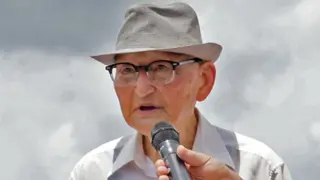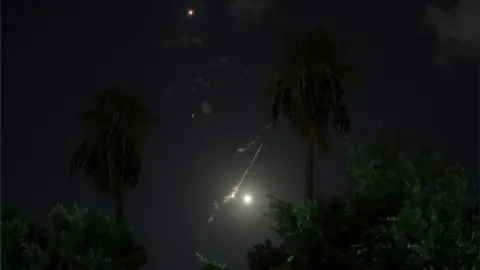BBC Korean, in Paju
On a blistering morning earlier this week, an unusually large crowd had gathered at Imjingang Station – the last stop on Seoul’s metropolitan subway line that inches the closest to North Korea.
There were dozens of activists and police officers, their attention fixed on one man: Ahn Hak-sop, a 95-year-old former North Korean prisoner of war who was making his way home, to the other side of the border that divides the Korean peninsula.
It was what Mr Ahn called his final journey – he wanted to return to the North to be buried there, after spending most of his life in South Korea, much of it against his will.
He never made it across: he was turned away, as was expected because the South Korean government had said they did not have enough time to make the necessary arrangements.
But Mr Ahn came as close as he could.
Weakened by pulmonary oedema (a build up of fluid on the lungs), he could not manage the 30 minute walk from the station to the Unification Bridge – or Tongil Dae-gyo – one of the few passageways connecting South Korea to the North.
So he stepped out of the car roughly 200 metres from the bridge and walked the final stretch on foot, flanked by two supporters who steadied him.
He returned holding a North Korean flag, a sight rarely seen and deeply jarring in the South, and addressed the reporters and 20 or so volunteers who had turned up in support.
“I just want my body to rest in a truly independent land,” he said. “A land free from imperialism.”
Living on the other side
Ahn Hak-sop was 23 when he was captured by the South Koreans.
Three years earlier, he had been in high school when then-North Korean ruler Kim Il-sung attacked the South. Kim, who wanted to reunify the two Koreas, rallied his countrymen by claiming that the South had initiated the 1950 attack.
Ahn was among those who believed this. He joined the North Korean People’s Army in 1952 as a liaison officer, and was then assigned a unit that was sent to the South.
He was captured in April 1953, three months before the armistice, and sentenced to life in prison the same year. He was released more than 42 years later because of a special pardon on the Korean independence day.
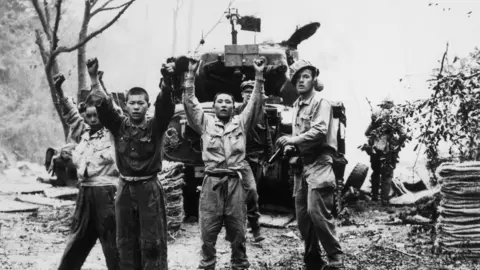 Universal History Archive/Universal Images Group via Getty Images
Universal History Archive/Universal Images Group via Getty ImagesLike many other North Korean prisoners, Mr Ahn too was labelled a “redhead”, a reference to his communist sympathies, and he struggled to find a proper job.
It wasn’t easy, he told the BBC in an earlier interview in July. The government didn’t help much at first, he said, agents followed him for years. He married, and even fostered a child, but he never felt he truly belonged.
Throughout, he made his home in a small village in Gimpo, the closest a civilian can live to the border with the North.
Yet in 2000, he turned down the chance to be sent back to the North along with dozens of other prisoners who also wanted to return.
He had been optimistic then that ties between the two sides would improve, that their people would be able to travel back and forth freely.
But he chose to stay because he feared leaving would be a win for the Americans.
“At the time, they were pushing for US military governance [in the South],” he said.
“If I returned to the North, it would’ve felt like I was just handing over my own bedroom to the Americans – vacating it for them. My conscience as a human being just couldn’t allow that.”
It’s not clear what he was referring to other than growing ties between Seoul and Washington, which include a strong military alliance that guarantees South Korea protection from any attack from the North.
That relationship deeply bothers Mr Ahn, who has never stopped believing the Kim family’s propaganda – that the only thing stopping the reunification of the Korean peninsula was an “imperialist America” and a South Korean government that was beholden to them.
Fighting for North Korea
Born in 1930 in Ganghwa County, Gyeonggi Province, during Japan’s colonial rule of the Korean Peninsula, Mr Ahn was the youngest of three brothers. He also had two younger sisters.
Patriotism took root early. His grandfather refused to let him attend school because he “didn’t want to make me Japanese”, he recalled. So he started school later than usual, after his grandfather died.
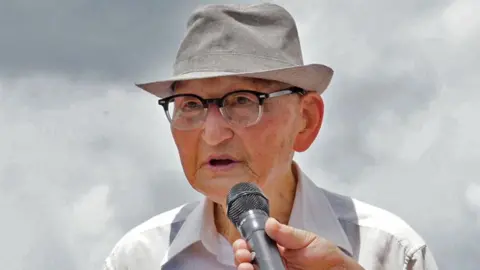 Jungmin Choi/BBC
Jungmin Choi/BBCWhen Japan surrendered in 1945, bringing an end to World War Two and its colonisation of Korea, Mr Ahn and his younger brother, who had deserted the Japanese military, were hiding at their aunt’s house at the foot of Mount Mani on Ganghwa Island.
“That wasn’t liberation – it was just a transfer of colonial rule,” he said.
“A leaflet [we saw] said that Korea wasn’t being liberated, but that US military rule would be implemented instead. It even said that if anyone violated US military law, they would be strictly punished under military law.”
As the Soviet Union and the US tussled over the Korean peninsula, they agreed to to divide it. The Soviets took control of the North and the US, the South, where they set up a military administration until 1948.
When Kim attacked in 1950, a South Korean government was in place – but Mr Ahn, like so many North Koreans, believes the South provoked the conflict and that its alliance with Washington prevented reunification.
Unwavering belief
Once he was captured, Mr Ahn had several chances to avoid prison – he was asked to sign documents renouncing the North and its communist ideology, which was called “conversion”. But he refused.
“Because I refused to sign a written oath of conversion, I had to endure endless humiliation, torture, and violence – days filled with shame and pain. There’s no way to fully describe that suffering in words,” he told the crowd that had gathered near the border on Wednesday.
The South Korean government never responded to this particular charge directly, although a special commission acknowledged violence at the prison in 2004. Mr Ahn’s direct allegations were investigated by the Truth and Reconciliation Commission of South Korea, an independent body investigating past human rights abuses, in 2009, which found that there had been a deliberate effort to force his conversion, which included acts of torture.
It has long been accepted in South Korea that such prisoners often encountered violence behind bars.
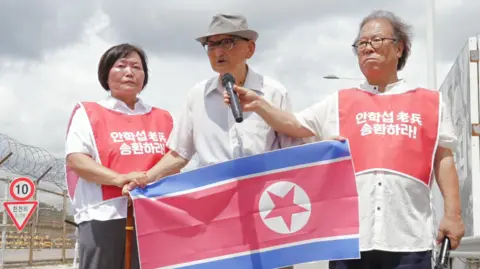 Jungmin Choi/BBC
Jungmin Choi/BBC“Whenever I regained consciousness, the first thing I checked was my hands – to see if there was any red ink on them,” Mr Ahn recalled in his July interview.
That usually signalled that someone had forced a fingerprint onto a written oath of ideological conversion.
“If there wasn’t, I’d think, ‘No matter what they did, I won’. And I felt satisfied.”
The North has changed remarkably since Mr Ahn left. Kim Il-sung’s grandson now runs the country – a reclusive nuclear-armed dictatorship that is richer than it was in 1950, but remains one of the poorest countries in the world. Mr Ahn was not in the North for the devastating famine in the 1990s that killed hundreds of thousands. Tens of thousands of others fled, making deadly journeys to escape their lives there.
Mr Ahn, however, dismissed the suggestion of any humanitarian concerns in the North, blaming the media for being biased and only reporting on the dark side of the country. He argues that North Korea is prospering and defends Kim’s decision to send troops to aid Russia’s invasion of Ukraine.
The South has also changed in Mr Ahn’s time here – once a poor military dictatorship, it is now a wealthy, powerful democracy. Its relationship with the North has had its ups and downs, wavering between open hostility and hopeful engagement.
But Mr Ahn’s beliefs have not wavered. He has dedicated the last 30 years of his life to protesting a country that he believes is still colonising South Korea – the US.
“They say humans, unlike animals, have two kinds of life. One is basic biological life – the kind where we talk, eat, defecate, sleep, and so on. The second is political life, also called social life. If you strip a human being of their political life, they’re no different from a robot,” Mr Ahn told the BBC in July.
“I lived under Japanese colonial rule all those years. But I don’t want to be buried under [American] colonial rule, even in death.”
Additional reporting by Jungmin Choi in Seoul
